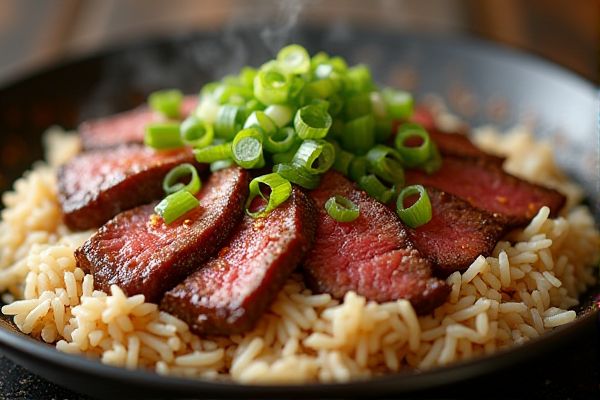
Yakiniku Beef Pepper Rice from Pepper Lunch features tender, marinated beef slices sizzling on a hot plate, mixed with fragrant steamed rice, fresh green onions, and a bold pepper seasoning, delivering a flavorful and aromatic meal with a satisfying, savory crunch.
Equipments
- Hot plate (cast iron skillet or teppan plate)
- Rice cooker
- Mixing bowl
- Tongs
- Knife
- Cutting board
- Measuring spoons
- Spatula
- Serving spoon
Ingredients
- 8 oz (225g) thinly sliced beef (ribeye or sirloin)
- 2 cups steamed white rice
- 1 tablespoon soy sauce
- 1 tablespoon oyster sauce
- 1 teaspoon sugar
- 1 tablespoon mirin (optional)
- 2 tablespoons unsalted butter
- 2 tablespoons corn (canned or fresh)
- 2 stalks green onions, sliced
- 1 teaspoon freshly ground black pepper
- Salt, to taste
- 2 cloves garlic, minced
- 1 tablespoon vegetable oil
Use thinly sliced ribeye or sirloin for tender, juicy beef that cooks quickly and absorbs the marinade well. Freshly steamed white rice is essential to achieve the right texture and balance with the savory toppings. Adjust the amount of black pepper to your taste, as it adds the signature bold spice characteristic of Yakiniku Beef Pepper Rice. Incorporate unsalted butter and corn to enhance the dish's richness and subtle sweetness. Your Yakiniku Beef Pepper Rice from Pepper Lunch copycat menu will come alive with these carefully selected ingredients, capturing the authentic flavor and aroma of the original dish.
Instructions
- Cook 2 cups of white rice in a rice cooker.
- Mix soy sauce, oyster sauce, sugar, mirin (if using), and minced garlic in a mixing bowl.
- Marinate sliced beef in the sauce mixture for 10–15 minutes.
- Slice green onions and prepare corn.
- Preheat the hot plate or cast iron skillet until very hot.
- Add vegetable oil and swirl to coat the surface evenly.
- Place steamed rice in the center of the hot plate.
- Arrange marinated beef slices around the rice.
- Add corn and butter on top of the rice.
- Sprinkle freshly ground black pepper and salt over everything.
- Sear beef for 1–2 minutes, then use tongs or a spatula to mix beef, rice, corn, and seasonings together on the hot plate.
- Cook until beef is just cooked through and everything is evenly mixed.
- Garnish with sliced green onions.
- Serve immediately while sizzling.
Substitution
Yakiniku Beef Pepper Rice from Pepper Lunch copycat menu delivers a sizzling combination of marinated beef and pepper-seasoned rice cooked on a hot plate. If a hot plate or cast iron skillet is not available, a heavy-bottomed frying pan can be used to approximate the cooking experience. When ribeye or sirloin is unavailable, thinly sliced flank steak or chuck can be substituted, though the tenderness may vary. If fresh corn is not on hand, frozen corn works well and should be thawed before use to maintain texture. You can adjust the pepper seasoning to your taste for a milder or spicier flavor profile without compromising the dish's signature aroma.
Tips
Ensure your hot plate or cast iron skillet is preheated until very hot before adding oil to achieve a perfect sear on the beef, locking in its juices and flavor. Marinate the beef for at least 10 minutes to allow the soy sauce, oyster sauce, and mirin to tenderize and infuse the meat thoroughly. When mixing the beef, rice, and seasonings on the hot plate, work quickly to prevent overcooking the beef while ensuring all flavors blend evenly. Your sizzling Yakiniku Beef Pepper Rice is best served immediately to enjoy the dish's signature aroma and satisfying texture.
Nutritions
Yakiniku Beef Pepper Rice provides a rich source of protein from the thinly sliced ribeye or sirloin beef, essential for muscle repair and maintenance. Your meal also includes carbohydrates primarily from steamed white rice, which fuels your body with quick energy. The inclusion of vegetables like corn and green onions adds dietary fiber, vitamins, and antioxidants supporting overall health. Butter and vegetable oil contribute healthy fats that aid in nutrient absorption and provide a satiating texture.
Storage
Store leftover Yakiniku Beef Pepper Rice in an airtight container and refrigerate within two hours of cooking to maintain freshness and prevent bacterial growth. Consume refrigerated leftovers within 2-3 days by reheating them thoroughly on a hot plate or skillet to restore the savory flavors and sizzling texture. Avoid freezing the dish, as it can compromise the texture of the marinated beef and the buttery rice mixture.
Variation or Alternatives
You can replace ribeye or sirloin with thinly sliced chuck or flank steak for a leaner option without sacrificing flavor. Swap white rice with jasmine or brown rice to introduce a nuttier taste profile and added texture. To enhance umami, consider adding a splash of sesame oil to the marinade or mixing in sauteed mushrooms with the corn. If you prefer a smoky flavor, briefly grill the marinated beef before adding it to the hot plate for a caramelized crust.
Allergies
Yakiniku Beef Pepper Rice contains soy sauce and oyster sauce, both common allergens due to soy and shellfish ingredients. Butter introduces dairy, which may cause reactions in lactose-intolerant individuals or those with milk allergies. Your meal includes garlic and pepper, which can sometimes trigger sensitivities or digestive issues for certain people.
Why this recipe?
The Yakiniku Beef Pepper Rice from Pepper Lunch restaurant features tender, marinated beef sizzling over hot rice, creating a unique, interactive dining experience that combines flavor and texture. Its special blend of soy-based sauce and freshly ground black pepper enhances the savory richness, appealing to lovers of bold, umami-packed meals. You can recreate this dish at home, ensuring the perfect balance of spicy and savory flavors while enjoying a cost-effective and personalized version. Making the copycat recipe allows you to savor a restaurant-quality meal with the satisfaction of mastering a beloved Japanese favorite.
